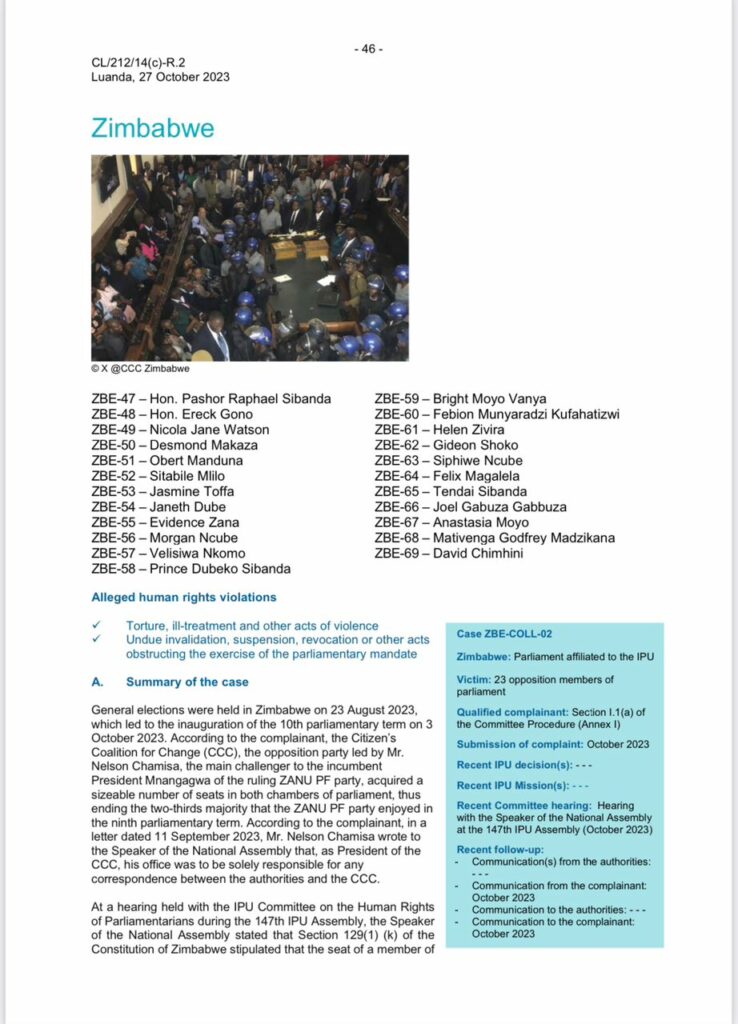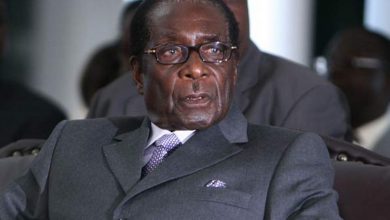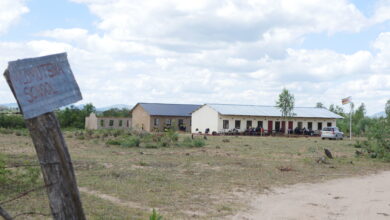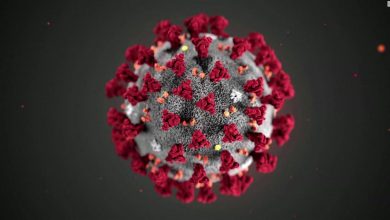Inter-Parliamentary Union urges Zimbabwe to amend recall provision

The Inter Parliamentary Union (IPU) Committee on the Human Rights of Parliamentarians hopes that Zimbabwe’s Parliament will “seriously consider” amending the recall provision that allows political parties to recall elected lawmakers in order for them to carry out their work freely without undue pressure from their political parties.
The IPU stated these recalls violate the basic principles of free representational mandate and the right to freedom of expression, which the Committee has consistently defended.
The Committee also stated that a visit to Zimbabwe as soon as possible is required to further investigate these recalls.
These sentiments come after the Citizens Coalition for Change (CCC) escalated their case to the IPU, to which Zimbabwe is affiliated, indicating the Speaker of the National Assembly recalled 14 National Assembly members while the President of the Senate dismissed nine senators on the basis of a letter authored by Sengezo Tshabangu, who the party labelled an “imposter, with no position or authority to recall any CCC members.”

CCC in case ZBE-CoLL-02, before the IPU claimed the Speaker denied its parliamentarians the right to be heard before rescinding their parliamentary mandate on October 10, 2023.
“(The Committee) is deeply concerned that 23 opposition parliamentarians lost their seats following the decision of the Speaker of the National Assembly and the President of the Senate to revoke their mandate on the basis of a deeply contested letter from an individual who is allegedly unrelated to the party to which these legislators belong,” read the read case note after a hearing was held by the IPU Committee on the Human Rights of Parliamentarians during the 147th IPU Assembly held in Luanda on October 27, 2023.
IPU also said it “appreciates the argument put forward by the Speaker, Jacob Mudenda, that he acted in line with Section 129(1)(k) of Zimbabwe’s Constitution” but “fails to see any reasonable grounds for accepting an official communication from an unknown individual without being satisfied that the said communication is legitimate and without seeking the point of view the individuals concerned or the president of the party.”
“(The Committee) is troubled by the affirmation that the official communication from the leader of the party to which the 23 parliamentarians belonged was not taken into account because it was reportedly received after the recall, even though it was dates three weeks before that decision was taken;
“(The Committee) is puzzled by the swiftness with which the decision to revoke the mandate of the newly elected parliamentarians was taken and the fact that no debate on the issue was allowed. (The Committee) wishes to receive additional clarification from the parliamentary authorities of the National Assembly and the Senate on the points above.”
IPU said it was “convinced that this new case and the ongoing cases from Zimbabwe before the Committee on the Human Rights of Parliamentarians require the organisation of a mission by the IPU Committee to Zimbabwe as soon as practicable.”
“Thanks to the Speaker of the National Assembly for his renewed commitment to making arrangements with the Ministry of Justice to facilitate the organisation of such a mission ahead of the 173rd session of the IPU committee scheduled to take place in January 2024 and looks forward to receiving information on the specifics of the mission as soon as possible,” read the case note.
The IPU also requested the Committee to continue examining this case and to report back to it in due course.
When the Speaker appeared before this case, he claimed had he received Chamisa’s letter on time, his decision “may have been quite different.”
“The Speaker also stated the CCC did not have clear and publicly well-known internal structures or names of those holding the most important positions in the party. Should a request to recall members of the National Assembly belonging to Zanu PF be put before him, he said it was public knowledge who was entitled within the party to make that request,” read the case note.
However, CCC said the Speaker denied its parliamentarians the right to be heard before proceeding with the revocation of their parliamentary mandate on October 10, 2023.
“The complaint claims the Speaker acted unconstitutionally by ignoring the written and oral submission of known members of the CCC by refusing any discussions on this issue and by accepting the letter from Tshabangu without making sure that it was a legitimate communication from the political party concerned,” read the case note.
In addition, CCC alleges that the Speaker “ordered the intervention of a unit of riot police that had violently evicted the CCC parliamentarians from the National Assembly after they had refused to leave the House and protested against the recall of their colleagues. According to the complainant, several parliamentarians sustained injuries as a result of police brutality in the House.”
“The complaint submits that the Speaker suspended all CCC National Assembly members for the House for six sittings and their salaries for two months.”
IPU noted that CCC said these concerns “have to be seen as part of a pattern of repression, the erosion of the independence of the judiciary and the shrinking civic space that accompanies the disputed 2023 elections, as well as pre-existing violations of the rights of parliamentarians belonging to the opposition.”






